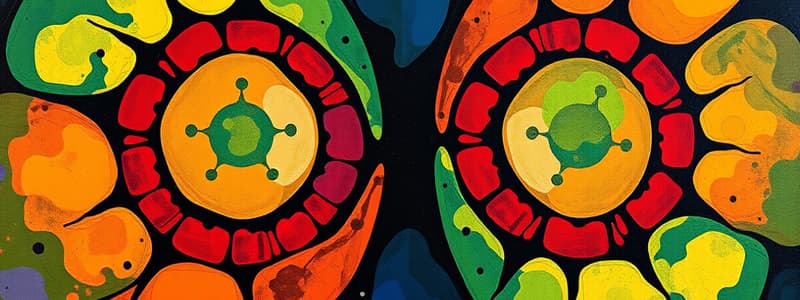Podcast
Questions and Answers
Why doesn't a plant cell undergo cytokinesis the same way as an animal cell?
Why doesn't a plant cell undergo cytokinesis the same way as an animal cell?
The rigid cell wall cannot pinch inward; it isn't flexible enough.
Describe the role of microtubules in mitosis. Why must microtubules both assemble and disassemble for mitosis to occur properly?
Describe the role of microtubules in mitosis. Why must microtubules both assemble and disassemble for mitosis to occur properly?
Microtubules help the chromosomes start to split during metaphase and anaphase. They both assemble and disassemble so that the chromosomes can get to the opposite poles in telophase.
During what phase of mitosis do you expect to see microtubules forming?
During what phase of mitosis do you expect to see microtubules forming?
Prophase
What is the name of the microtubules that form?
What is the name of the microtubules that form?
During what phase do these microtubules begin to assemble?
During what phase do these microtubules begin to assemble?
How could Taxol, which binds microtubule proteins and prevents their disassembly, affect cell division?
How could Taxol, which binds microtubule proteins and prevents their disassembly, affect cell division?
In order for the cell to divide successfully, what must the cell first do?
In order for the cell to divide successfully, what must the cell first do?
Where are sister chromatids attached?
Where are sister chromatids attached?
If a cell has 6 chromosomes, how many chromosomes will each of its daughter cells have after mitosis and cytokinesis?
If a cell has 6 chromosomes, how many chromosomes will each of its daughter cells have after mitosis and cytokinesis?
What happens when a cell divides?
What happens when a cell divides?
What does anaphase do?
What does anaphase do?
What does prophase do?
What does prophase do?
What does telophase do?
What does telophase do?
What does metaphase do?
What does metaphase do?
What does interphase do?
What does interphase do?
What are the stages of the cell cycle?
What are the stages of the cell cycle?
During what stage does the size of the cell increase?
During what stage does the size of the cell increase?
During which phase does the number of cells increase?
During which phase does the number of cells increase?
What part is most affected by cancer cells?
What part is most affected by cancer cells?
What phase does DNA duplicate?
What phase does DNA duplicate?
What occurs during mitosis?
What occurs during mitosis?
Is the original cell dead or does it disappear after mitosis?
Is the original cell dead or does it disappear after mitosis?
In order for the cell to divide normally, what needs to happen?
In order for the cell to divide normally, what needs to happen?
Where does the cell cycle happen?
Where does the cell cycle happen?
Where does PMAT happen?
Where does PMAT happen?
What is a cancer cell?
What is a cancer cell?
What regulates cell division?
What regulates cell division?
What is a carcinogen?
What is a carcinogen?
What is a mutagen?
What is a mutagen?
What is an oncogene?
What is an oncogene?
What are proto-oncogenes?
What are proto-oncogenes?
What are tumor suppressor genes?
What are tumor suppressor genes?
What is a tumor?
What is a tumor?
What does cytokinesis mean?
What does cytokinesis mean?
In what types of cell does mitosis occur?
In what types of cell does mitosis occur?
What is G0?
What is G0?
What happens during G1?
What happens during G1?
What happens during the S phase?
What happens during the S phase?
What happens during G2?
What happens during G2?
What does M phase represent?
What does M phase represent?
Flashcards are hidden until you start studying
Study Notes
Cell Division and Mitosis
- Plant cells cannot undergo cytokinesis like animal cells due to their rigid cell wall structure.
- Microtubules are crucial in mitosis for chromosome separation and assembly/disassembly facilitate movement towards opposite poles during anaphase.
- Microtubule formation begins in prophase, specifically forming spindle fibers.
- Spindle microtubules are responsible for connecting to the chromosomes during mitosis.
Mitosis Phases Overview
- Anaphase involves the rapid disassembly of spindles, leading to the separation of chromatids.
- Prophase includes disintegration of the nuclear envelope and condensation of chromosomes.
- Telophase marks the completion of mitosis and reformation of the nuclear envelope.
- Metaphase is characterized by spindle fibers connecting to centromeres, aligning chromosomes in preparation for separation.
- Interphase involves cell growth, DNA replication, and organelle synthesis, occurring prior to mitosis.
Cell Cycle and Regulation
- The cell cycle comprises G1, S, G2, and M phases, each playing a role in cell preparation and division.
- G1 is when the cell size increases and is most affected by cancer cells, often leading to unregulated growth.
- The S phase is critical for DNA duplication, ensuring daughter cells have identical genetic material.
- G2 focuses on organelle growth and preparing for mitosis, which occurs in phase M.
- Cancer cells divide uncontrollably, representing a disruption in the regulation of the cell cycle.
Cancer and Genetic Factors
- Cyclins (CDKs) are regulatory proteins that signal the cell to progress through the cell cycle.
- Carcinogens are substances that promote cancer by inducing cell mutations or disrupt normal cell division.
- Mutagens specifically cause genetic mutations that can lead to cancerous growth.
- Oncogenes are genes that, when mutated, drive uncontrolled cell division.
- Proto-oncogenes normally regulate cell division, but mutations can cause them to function improperly.
- Tumor suppressor genes signal cells to cease dividing; defects lead to uncontrolled growth.
Additional Concepts
- Cytokinesis is the division of cytoplasm post-mitosis, crucial for forming two separate daughter cells.
- Mitosis occurs in all cells excluding sperm and egg cells, which undergo meiosis instead.
- G0 phase represents a resting state where cells are not actively dividing but may return to the cycle if prompted.
- Each daughter cell after mitosis retains the same chromosome count as the parent cell.
- The original cell persists after division, capable of re-entering the cell cycle.
Studying That Suits You
Use AI to generate personalized quizzes and flashcards to suit your learning preferences.




